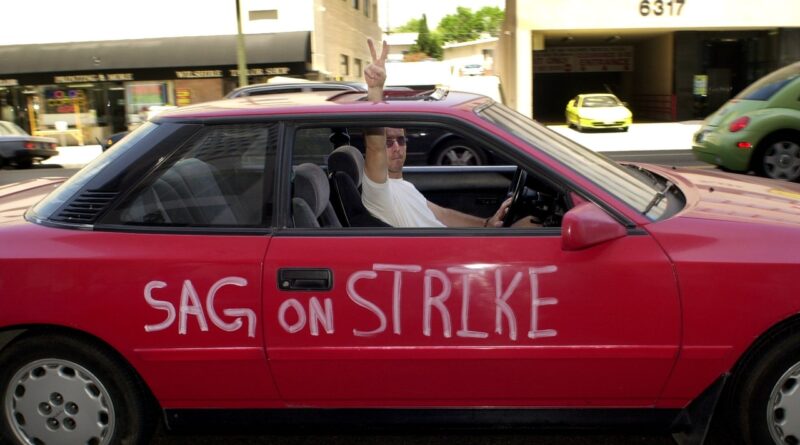SAG-AFTRA Is Officially Going on Strike. Here’s What That Means.
This article was originally published by Vogue.
After four weeks of talks with the Alliance of Motion Picture and Television Producers (AMPTP), members of SAG-AFTRA—a union representing more than 160,000 television and movie actors, voice artists, and other entertainment professionals—officially go on strike at midnight, marking the first time since 1960 that Hollywood actors and writers (now two months into their own strike) have both stopped work. “The studios and streamers have implemented massive unilateral changes in our industry’s business model, while at the same time insisting on keeping our contracts frozen in amber,” Duncan Crabtree-Ireland, the chief negotiator of SAG-AFTRA, has said. “Their refusal to meaningfully engage with our key proposals and the fundamental disrespect shown to our members is what has brought us to this point.”
So, what does all this mean, exactly? Read on for a summary.
What does SAG-AFTRA actually want?
In May, Crabtree-Ireland and SAG-AFTRA president Fran Drescher sent a letter to the union outlining the terms of its negotiations with AMPTP—which includes Amazon, Apple, Disney, NBCUniversal, Netflix, Paramount, Sony, and Warner Bros. Discovery—for a new contract, flagging the possibility of a strike “if the AMPTP does not agree to essential contract improvements.”
“The business model of our industry has changed significantly,” Crabtree-Ireland and Drescher wrote. “We have fully entered a digital and streaming entertainment industry, and that demands a contract that is relevant to the new business model and must be contemporary to meet the financial needs of our members today.” That contract, they noted, should “increase contributions to our benefit plans and protect members from erosion of income due to inflation and reduced residuals, unregulated use of generative AI, and demanding self-taped auditions.” The advent of streaming has also changed how television is structured, ushering in shorter season orders and longer breaks between seasons that have, in turn, made it “increasingly difficult for our members to achieve and maintain a middle-class lifestyle working as a performer,” the union has stated. (As one report found in 2019, unemployment among professional actors “[hovers] at around 90%” at any given time.)
On June 5, nearly 65,000 members of SAG-AFTRA—just shy of half of all eligible voters—voted 97.91% in favor of a strike authorization should negotiations fail. Although its previous three-year contract was due to expire at midnight on June 30, it was extended until July 12 to accommodate further talks with the studios. On July 13, the strike was officially confirmed in a press conference after those talks collapsed and the national board of SAG-AFTRA (including the likes of Joely Fisher, Matthew Modine, Sheryl Lee Ralph, and Sharon Stone) conducted an additional vote.
So, what does all this mean for new and existing film and TV productions?
SAG-AFTRA members will not show up for work on scripted films or series until a new contract has been negotiated, effectively shutting Hollywood down in the interim. Work in the theater, however, will not be affected; while many stage actors are also members of SAG-AFTRA, a different union, the Actors’ Equity Association, represents them in stage productions. News anchors, soap actors, talk-show hosts, and game-show hosts, who are represented by SAG-AFTRA but under a different contract, will not be affected, either; theirs doesn’t expire until next year.
What about for award shows, premieres, and film festivals?
In a statement to Deadline, SAG-AFTRA confirmed that there is “no promotion of struck work during a strike. Promotional activities in relation to a signatory production [one that has an agreement with SAG] is covered work under the Basic Agreement and thus is struck work during a strike.” So, should the strike go on that long, that would mean few to no American stars at the Venice or Toronto film festivals, the New York Film Festival, or the Emmys, for example. (In 1980, a similar actors strike lasted from July 21 until October 23, with 51 of that year’s 52 Primetime Emmy nominees—all but Powers Boothe, a winner that year for his leading role in Guyana Tragedy: The Story of Jim Jones—boycotting the ceremony. In 1986, however, another lasted just 14 hours.)
What about for press outlets?
Because actors are not permitted to promote their film and television work, expect their press to be limited to nonacting projects: charities, music ventures, fashion and beauty partnerships, et cetera.
So…what happens now?
We wait. Studios have already signaled that they are willing to let the situation with the WGA quote-unquote bleed out; as one executive alarmingly told Deadline, “The endgame is to allow things to drag on until union members start losing their apartments and losing their houses.” October was floated as a date for resuming those talks. What things will look like for SAG-AFTRA members, however, is yet to be seen.




